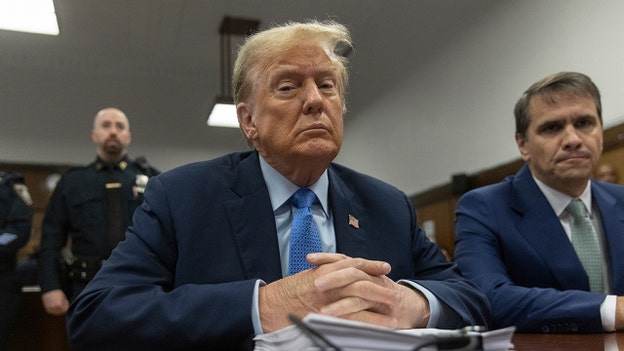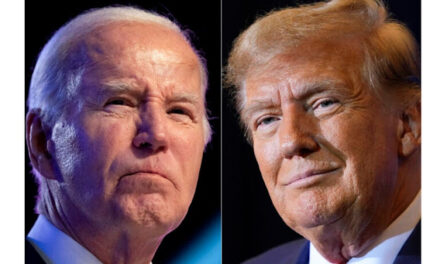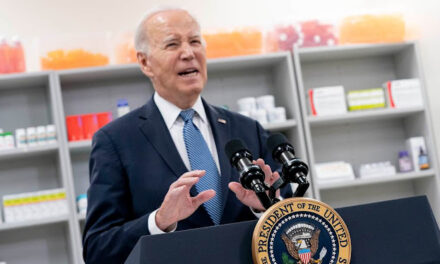LTP News Sharing:
Former President Donald Trump appears at Manhattan criminal court before his trial in New York, Friday, April 26, 2024. (Jeenah Moon/Pool Photo via AP)
Special Prosecutor Jack Smith’s case against Donald Trump was argued in the Supreme Court today. The issue is the extent to which ex-presidents are entitled to immunity for acts committed while they were in office. The New York Times covered the arguments with live updates. Here are some excerpts:
Overall, several justices — maybe a majority — appear to have suggested through their questions that presidents should indeed enjoy some level of immunity from criminal prosecution. The questions seem to be how to decide what actions are protected from criminal charges and whether the allegations in Trump’s indictment in particular would qualify for immunity.
Presidents surely should have immunity with regard to some official acts, perhaps all. There is no question about the fact that some presidential acts are immune:
Dreeben says there are some core constitutional functions of a presidency — he cites the pardon power, the power to recognize foreign nations, the power to veto legislation, the power to make appointments — that Congress cannot regulate and so criminal statutes cannot be applied to such actions. Justice Gorsuch declares that is essentially immunity for some official acts.
Smith is persecuting Trump under a fraud conspiracy statute that, as some justices pointed out, is vague:
Justice Alito now joins Justice Kavanaugh in suggesting that the fraud conspiracy statute is very vague and broadly drawn. That is bad news for the indictment brought against Trump by Jack Smith, the special counsel.
The Times reporters are grotesquely biased against not just Trump, but Republicans. For example:
During the George W. Bush administration, memos about post-9/11 surveillance and torture were written by a politically appointed lawyer with idiosyncratically broad views of a president’s supposed power, as commander in chief, to authorize violations of surveillance and torture laws. The Justice Department later withdrew those memos as espousing a false view of the law, but held that officials who had taken action based on those memos could not be charged with crimes.
The “politically appointed lawyer with idiosyncratically broad views of a president’s power” was, I believe, John Yoo. No Democrat could ever be a politically appointed lawyer with idiosyncratic views. And Yoo’s views were not idiosyncratic. I don’t recall that either he or anyone else wrote memos about the president’s “supposed power…to authorize violations of surveillance and torture laws.” The memos I recall addressed the question of what constitutes “torture” within the meaning of federal law, and concluded–correctly, in my opinion–that the interrogation techniques then being used on terrorists were not torture within the meaning of the statute. The “Justice Department”–that is, the Democratic Party Justice Department under Barack Obama–did withdraw those memos, in what I think was a political act. But of course, those lawyers were not “politically appointed” and didn’t have “idiosyncratic views.”
But that was all a digression. Steve no doubt knows more about it.
The Supreme Court justices no doubt care about the future prospect of either 1) lawless presidents or 2) a cycle of meritless prosecution of presidents once they leave office. (And believe me, when Joe Biden leaves office I hope Republicans can find a way to bring multiple criminal prosecutions against him.) But Jack Smith cares only about getting a conviction between now and November, however flimsy his theory may be. That appears doubtful; this is the Times’s summation:
The Supreme Court’s conservative majority appeared ready on Thursday to rule that former presidents have substantial immunity from criminal prosecution, a move that would further delay the criminal case against former President Donald J. Trump on charges that he plotted to subvert the 2020 election.
Such a ruling would most likely send the case back to the trial court to draw distinctions between official and private conduct. Those proceedings could make it hard to conduct the trial before the 2024 election.
Which would defeat the whole point of Smith’s prosecution. Finally, a comic note:
But a ruling in early summer, even if it categorically rejected Mr. Trump’s position, would make it hard to complete his trial before the election. Should Mr. Trump win at the polls, there is every reason to think he would scuttle the prosecution.
Well yes, one would think so!







